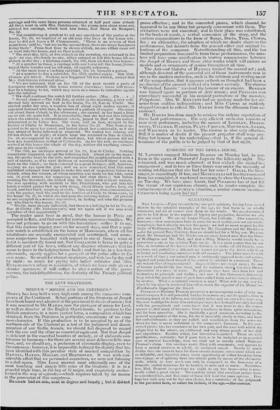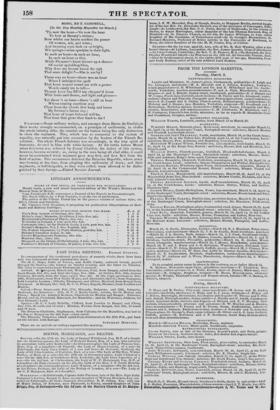GLEANINGS.
NEw reconsiderim4 our pa,t opinions, having be,:lf thereto by the splendid examples of the :ge, NW find them to let wholly erroneous, and we of course cast them to the winds. We.,ari., deteriniwil not to be left alone hi the regions of bigotry and prejudice, therefore we :di_ jure our creed. We are no longer I3igots, but Liberals. 'Our conversion, Itowever,—slow conversions have in them the most re ality,—is not vet totall completed but it already reaches this point : we feel no more respect for th-e Duke of Wellington and Mr. Peel, than for Mr. nroughain and Mr. littskissi,n. .--for the present Tory Ministry. than we should feel for a Whig oile. We e, it%
think Mr. Brougham and Mr. Iluskisson are mord honest men than the Doke of Wellington arid Mr. l'eel, and that a Whig Ministry would hardly he so pernicious a One as the existing Tory one is. It is a great matter that ivy are
able, in inotation of the leaders of the Cabinet, to shale gill old friends, connexions, and partialitie,; although we cannot yet go M the finish with th,o in loving and combilling ourselves with old enemies. The latter most In! NI lilt us a win k time ; our natural man is stubbornly opposed to it; and mit ore, bigoted and prejudiced though it be. cannot be subdued in a moment. The-o
are indeed days of improvement I Impossibilities are swept am ay ; the sun
of human perfectihility has risen, and its radiance shewi that even DiVi no IteVelatiOn is a mass of error. Its glorious rays have shct from law and institution, to principle and feeling-; ;111:1 IlOW it has discovered; that every Ling which the greatest men of past times called truth and wis.loin, is direydll he reverse. What a wonderful creature is man I What will he not so::,r to, when he has already rendered himself so much the superior of his 31 liter Blackwood's Nagazineibr 31,1,Tb. PISARONI.-11adanle Pisaroni possesses a mezzo-soprano voice of very Unusual compass. It is still powerful, hut has been more so j and its retaining much of its fulness, was infinitely richer and sweeter a few.;;cliN Ii She now is obliged to force it in certain passages, lest it should not bi.:y Inc ivilt with the promptitude and correctness that it was wont to do ; the conse quence is, that many of her notes have a hardness in them quite unfeminine,. and far from agreeable. She is decidedly a good musician according to thi. general acceptation of the term, for she is invariably steady in time, and her embellishments, as they are called, and wanderings from the notes set down for her, is never unfaithful to tl:c composer's harmony. Iii the concerted pieces, too, her exactness in her own part, and the care with which adapts that to the others, are additional and very strung proofs of her skill: and experience. Besides which, her intonation is perfect. These are high, qualifications, certainly; but if pure taste is to be included as an essential part of musical knowledge, then we shall not so readily admit Madaze Pisaroni's claim. She overlays every thing with ornaments, and appears to hare a 'Mortal aversion to a held, or sustained sound. Nearly as much dislike does she seem to have for those smooth diatonic successions which are so delightful, and therefore takes every opportunity of either breaking them into zigzags, or of splitting them into minute parts by means of the chromatic scale, which, as now used, can only he compared to the love-song of a domestic animal notorious for its hostility to mice and to music. Nevertheless, Mad. Pisaroni is—perhaps we ought to say has been—what is commonly called a great singer. We candidly admit that excellent judges have so considered her, and that, some of these still hold the same opinion. Perhaps her style may not be her own choice, but a surrender of her judgment to the perverted taste, or rather the fashion, of the age,—Barmonicon.
SONG, BY T. CAMPBELL,
[In the New Monthly Magazine for March.]
now the hour--'tis now the hour To bow at Beauty's shrine ; Now whilst our hearts confess the power Of woman, wit, and wine ; And beaming eyes look on so bright, Wit springs-wine sparkles in their light.
In such an hour-in such an hour, In such an hour as this,
While Pleasure's fount throws up a shower
Of social sprinkling bliss, Why does my bosom heave the sigh That mars delight ?-She is not by !
There was an hour-there was an hour When I indulged the spell That Love wound round me with a power Words vainly try to tell Though Love has fill'd my chequer'd doom With fruits and thorns, anti light and gloom Yet there 's an hour-there 's still an hour Whose coming sunshine may Clear front the clouds that hang and lower My fortune's future day : That hour of hours beloved will be, That hour that gives thee back to me!
UNtrottm.-Some military writers, and amongst them Baron de Sinclair,in their works strongly recommended, on a principle of uniformity, to clothe the whole infantry alike, the number on the button being the only distinction to show the regiment. This, which was so congenial to the system of equality, was naturally put into execution by the leaders of the French Revolution. The Whole French Infantry was accordingly, in the true spirit of fraternity, dressed in blue with white facings. At the battle before Mentz when that town was relieved by Count Clairfait, the defect of this system, however, became evident; as, owing to the men being all clad alike, it could never be ascertained what regiment gave way first, and first fled from the field of action. This occurrence deterred the Batavian Republic, whose army was forming at the time, from adopting this uniformity of dress ; and their regiments, or half-brigades, as they were called, were allowed to be distinguished by their facings.United Service Journal.



















 Previous page
Previous page